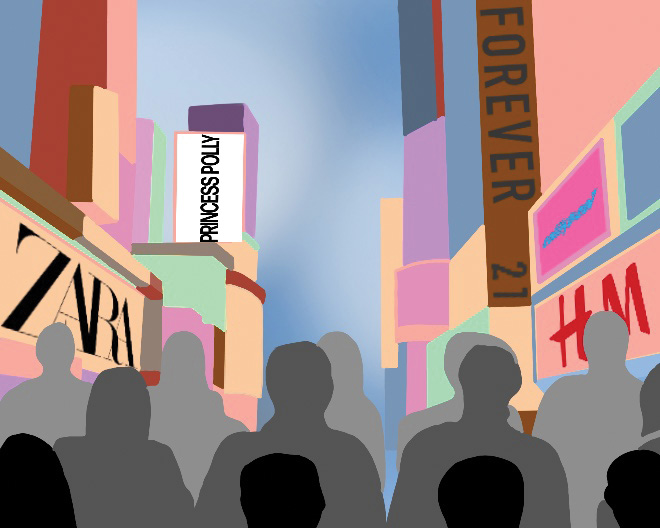Before I purchase anything, I always pause and ask myself if it is something that I really want to spend my money on. For example, when spending hours browsing Depop looking for the perfect wool sweater, I always wait at least a day before clicking that enticing “buy” button. Or, when I am brave enough to venture into a physical store, encouraged by my friends, I always ask myself whether or not I will use an item before purchasing it.
While this attitude may seem tedious and a mere sign of how often I tend to overthink, taking that extra second to ask myself if an item is a necessary purchase has taught me a valuable lesson: All things considered, there are actually very few things in this world that I need. I personally don’t want or need more than two pairs of jeans, Birkenstocks or Uggs and two navy blue sweaters that I switch off wearing from day to day.
Yet overconsumption is constantly emphasized in American culture. While there are very few things that we as consumers actually need, those who are privileged enough to have money to spare are encouraged to spend that money by consuming and then consuming some more. And during the holidays, with Black Friday just behind us and Christmas and Hanukkah around the corner, that desire for consumption is in full swing. To put it mildly, while I know that I can definitely appreciate a shopping trip once in a while, I am not a fan of the American tendency to constantly consume, and here’s why.
For starters, let’s talk about the environment. Of course, for those that take the time to visit used stores, comb through Etsy or eBay or research brands that sell ethically made products, I commend you. Yet, many consumers do not consume mindfully. During this holiday season, many fast fashion brands encourage people to buy without considering their environmental impact. While fault should certainly be placed in the hands of these companies for their carbon footprints, continuing to buy from them increases their negative environmental impacts. Instead, when possible, try to purchase from a sustainable company, or better yet, see if you can find used products to limit the effect that your consumption has on the environment.
Second of all, consumption impacts wealth distribution. In the 21st century, wealth inequality has only worsened. So in some cases, constantly buying from large-scale brands like Shein, Zara or Amazon (my number one worst enemy, I might add), causes wealth inequality to ramp up. Instead of supporting local businesses or workers, consumers are giving money to the uber-wealthy who own large corporations. These people often don’t support their employees and contribute to climate change. So, I encourage you to seek out local independent stores or purchase from websites such as Poshmark or Depop so your money goes to individual sellers (real human beings!) instead of large conglomerates.
I know the urge to shop is a common one, and I completely understand it. In this day and age, fighting mass consumerism is not an easy task, given that it is so deeply ingrained within American culture. Knowing that there is really only so much that you actually need, all I ask is that you take that extra second to pause and ask yourself if an item is one of those needs for you or whomever you are shopping for. And, if you decide it is, try to purchase it from an ethical company or scour the internet until you find a used version.







